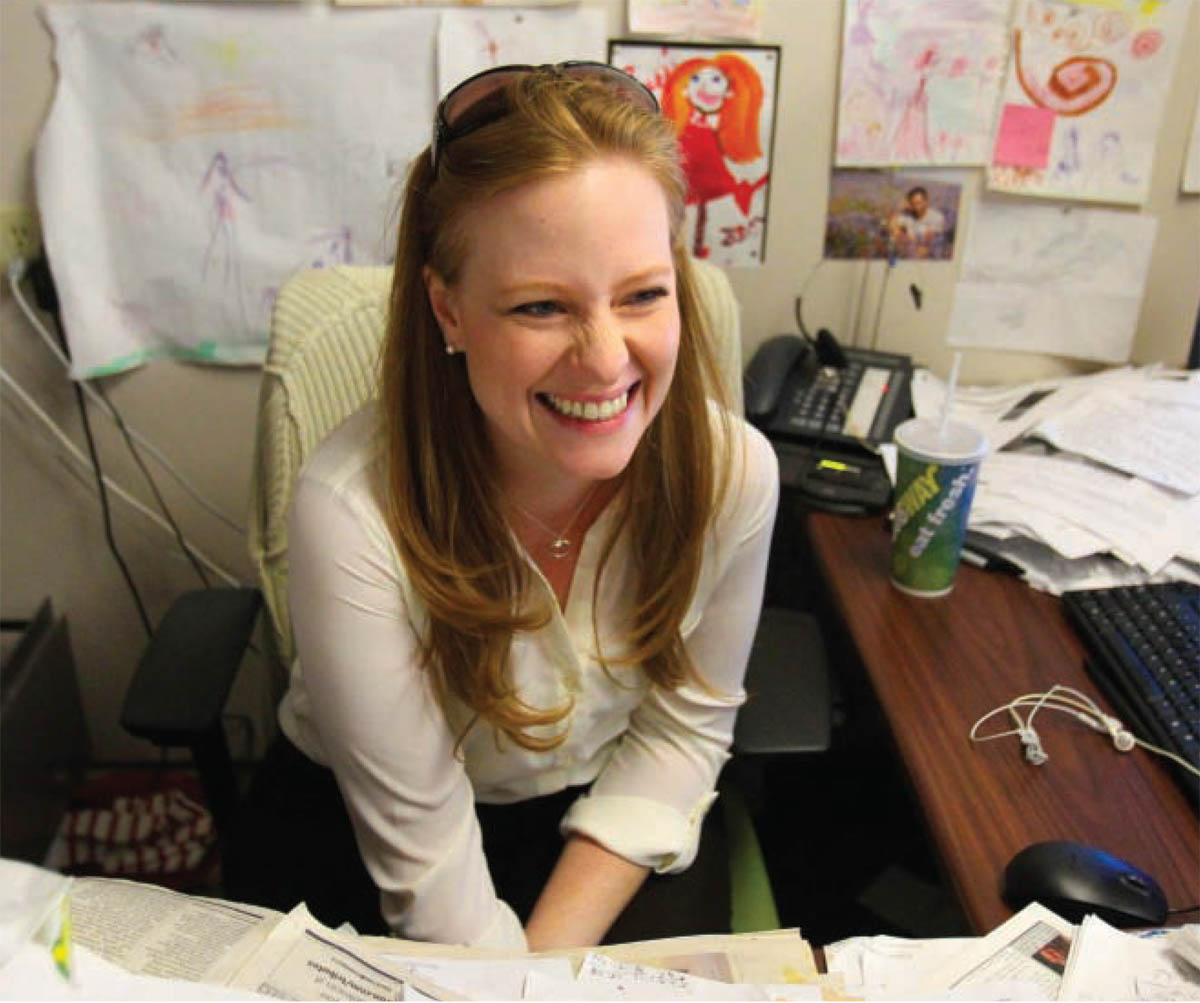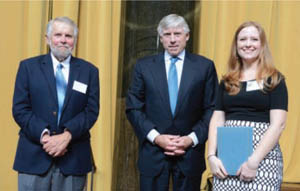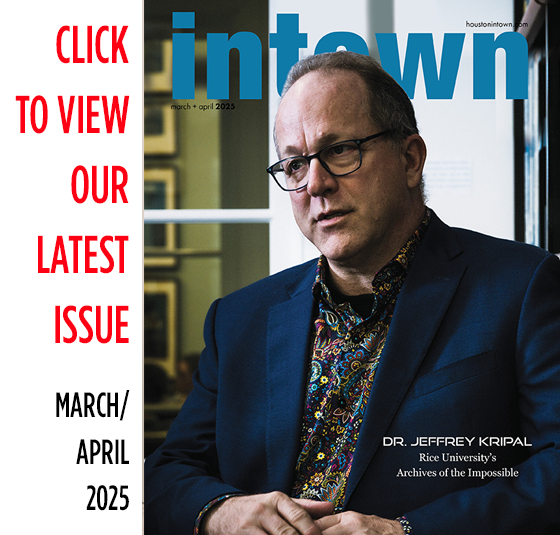2016 Person of the Year: Lisa Falkenberg

Socks put Pulitzer prize in perspective
One question Lisa Falkenberg asks herself, “Do socks matter?” Houston Chronicle’s only Pulitzer prize winner in its 115-year history has learned to put aside a tendency toward perfectionism. For the busy columnist and mother of two, if socks don’t match in the morning rush for school and work, she can let it go.
A sixth generation Texan, the top-of-the journalism-world scribe began writing at age seven. Her father, a truck driver, and her stay-at-home mom and later a special education aide, had the foresight to procure a set of encyclopedias. The seeds of digging for answers began when the children’s questions stumped Falkenberg’s father. He sent the two sisters and Lisa to the family research stacks to find the answers.
“We didn’t have a lot of books in the house. My father and mother didn’t go to college,” Falkenberg said. “I remember reading my mom some things I’d written. She would say, ‘Lisa, you didn’t write that. You must have gotten that from somewhere.’”
Inspired by stories about Nellie Blye, an early female reporter, Falkenberg rose quickly to the pinnacle of high school journalism as editor and columnist of the Cricket Chirps in Seguin, Texas. She had found her career nirvana – asking questions and writing. Soon journalism had her in shackles, literally. News reports about conditions in mental institutions gave her an idea. To learn about the criminal justice system in Guadalupe County, she had herself arrested, stripped searched and put on trial.
Wearing an orange jumpsuit and chains, she entered the courtroom. “Of course, I knew it was fake, but then I saw my mom. She was there to add to it. My mom is a very emotional person and she got into it, tears streaming down her cheeks, begging the judge to “let my daughter go.” After that, my interest in criminal justice never waned – the idea of how our rights can be stolen by institutions – where liberty can be taken away.”
Intimidated by college, Falkenberg applied to only one – because she had visited its campus. After two semesters at the University of Texas and on its college newspaper, the Daily Texan, she began a string of internships. Fact-checking and data entry for the campaign finance database at the Dallas Morning News helped her understand how government works. Others followed in D.C. and New York with Fortune Magazine and Kiplinger, the Florida Sun Sentinel.
After college, she worked at Austin bureaus for Scripps Howard and in 2001, Falkenberg joined the Associated Press. Covering everything from the Texas Legislature to Hurricane Katrina and the British Petroleum Texas City explosion put her on a fast track. The BP work caught the attention of the Houston Chronicle, which hired her to cover Austin. Then in 2007, Jeff Cohen, the Chronicle editor, offered her a column.
 “The idea scared me to death. I was 28 and still calling my mother to ask if the meat in the refrigerator was still good. But then I thought ‘Houston is the only city that will tolerate me. They are more tolerant because so many people are from somewhere else.’ I got a lot of criticism; some people called me the ‘teen virus.’” Nevertheless, she soon realized the ability to explain complex issues, to interact with readers gave her the power to influence change. Writing that brings about needed changes is key to the Pulitzer Committee’s considerations to choose a winner – like the change Falkenberg’s 2015 series of columns prompted in abolishing the “pick a pal” grand jury system in Texas.
“The idea scared me to death. I was 28 and still calling my mother to ask if the meat in the refrigerator was still good. But then I thought ‘Houston is the only city that will tolerate me. They are more tolerant because so many people are from somewhere else.’ I got a lot of criticism; some people called me the ‘teen virus.’” Nevertheless, she soon realized the ability to explain complex issues, to interact with readers gave her the power to influence change. Writing that brings about needed changes is key to the Pulitzer Committee’s considerations to choose a winner – like the change Falkenberg’s 2015 series of columns prompted in abolishing the “pick a pal” grand jury system in Texas.
Her radar blipped when she read about Alfred Dwayne Brown’s murder conviction and his release when new evidence emerged. Evidence that cleared him had been buried in the bottom of a retired detective’s “take-home” box. A telephone record of a call Brown made on a land line while at his girlfriend’s house confirmed he could not have murdered the police officer – the murder for which he had been on death row for more than a dozen years.
Mike Anderson, district attorney (deceased), called it a Brady violation. The term comes from the U.S. Supreme Court case Brady v. Maryland, in which the court ruled that suppression by the prosecution of evidence favorable to a defendant who has requested it violates due process.
Brown’s girlfriend had been his strongest alibi early during the investigation. After the grand jury hearing, she testified against him at the trial. Falkenberg planned to write one column, but soon her dad’s research training kicked in. Curious as to why the girlfriend changed her testimony, Falkenberg went to the courthouse and found the grand jury transcript.
“It was not a hearing,” Falkenberg said of the girlfriend’s time before the grand jury. “It was an interrogation. They told her she would never get another job, ‘We’ll take your children.’ I knew I had a big story. Who are these grand jurors? Why do they care? Why would they be so antagonistic?”
In a Google search on Brown’s jury foreman, the first item that came up was a contribution to a police organization. Falkenberg confirmed through multiple sources he was a working police officer. He had served as a grand juror more than five times. The system, she learned, was euphemistically referred to as “pick a pal.” A judge selects a “commissioner,” and that person picks his pals to serve on the grand jury.
“What kind of system is this,” she wondered, about how the system contributed to Brown’s conviction, and began to write seven columns. “He had a strong case, even if I hadn’t written a word,” Falkenberg said. “People have been protesting this (system) for decades. Even the Supreme Court said the (Texas) grand jury system needed to be changed. But nobody really cared.”
Dean of the Texas Senate and Chair of the Senate Criminal Justice Committee John Whitmire cared. He sponsored legislation that changed the system to the one used to pick trial jurors, names pulled from the driver’s license records and voters roles. Governor Greg Abbott signed the legislation in June 2015. Falkenberg’s Pulitzer citation reads: “For vividly-written, groundbreaking columns about grand jury abuses that led to a wrongful conviction and other egregious problems in the legal and immigration systems.”
At 38, and at the peak of her prestige and power as a journalist, Falkenberg puts her many honors before and after the Pulitzer in perspective. Her life has not changed much, she says. She struggles to find strong story ideas. She worries about the state’s educational system due to changing demographics in Texas and is hopeful that the younger generation will continue to evolve in tolerance.
As the song, “Rhinestone Cowboy” goes, “Offers coming over the phone” are, for now, appreciated but not practical with two young children at home. Even when she can’t match socks, she is confident about one thing: “I’ll keep doing this as long as they let me.”
 Falkenberg’s Pulitzer citation reads:
Falkenberg’s Pulitzer citation reads:
“For vividly-written, groundbreaking columns about grand jury abuses that led to a wrongful conviction and other egregious problems in the legal and immigration systems.”
Mike Pride, Pulitzer Prize Administrator (left), and Lee C. Bollinger, President of Columbia University (center), present the 2015 Commentary Prize to Lisa Falkenberg. Photo courtesy of Houston Chronicle.























